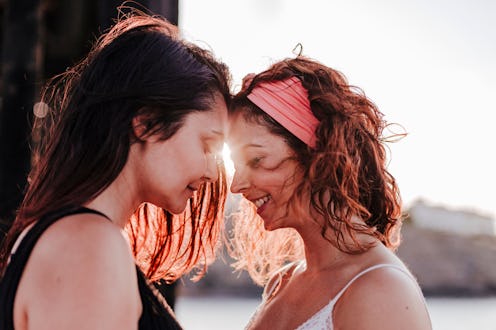Life
The Pros & Cons Of Only Dating People Who Are Your "Type," According To Experts

Whether you’re single, in a relationship, or somewhere in between, it's interesting to look at each of your partners and wonder what attracted you to them in the first place. Yes, looks are the obvious answer, but is there more at play here? Is having a type a real thing? And what is it that attracts us to certain traits in people? All my exes look pretty different, are interested in different things, and are from different places, but they all share the same sense of humour and a love for fantasy (I mean, I have four exes with Lord of the Rings tattoos). Is it possible to date outside of your normal type? And, more importantly, should you?
Having a type feels a little bit like an urban dating myth or the excuse you give your friends when something doesn’t work out — "they just weren't my type." However, dating and relationship expert Sarah Louise Ryan suggests, if you’re going for similar people, then there’s a reason. "We tend to attract people and personalities into our lives that are within our comfort zone," she says. "Our partners tend to sit in a familiar remit which helps to reinforce our belief system around ourselves." So, it would seem your vibe really does attract your tribe.
When it comes to "types," 23-year-old journalist Alex never really realised she had one. However, after closer inspection, she spotted a pattern. "When you look at the people I’ve dated they’ve all been artsy and creative," she says. In comparison, 27-year-old Lizzie has always instantly recognised her type. When it comes to men, she likes "tall, bearded, tattooed, and usually bald, rugby players or doormen." With women, it's "long hair, curvy, tattoos, usually brown hair, average height, and feminine."
Megan, a 25-year-old lawyer, is very aware of her type, too, but she thinks it may be limiting her when it comes to finding love. "I’ve always dated other lawyers, which I think is the first place I'm going wrong. I rarely date people with different political views, they always have to live [not in] their parents house, and I don’t date guys who are younger than me," she explains, adding: "I blame my type for the reason I’m still single."
And Imogen, a 28-year-old teacher, has also felt the downsides of dating very similar people. "I definitely had a type before I moved away from home. I found that all my partners were fairly preppy, from the same small town as me, and I really love going to the theatre and I seemed to date people who did too." While meeting her type was easy, she reaped the benefits of dating people who weren’t necessarily so similar. "Once you branch out, you try different hobbies, and meet people with other interests you expand your own horizons," she says. "Dating the same person over and over is comfortable but I think dating completely different people makes for more of an adventure. I know I've become more interesting as a person since dating people outside of my type."
When it comes to the psychology behind having a particular "type," Relate counsellor Peter Saddington says, "In some cases, a trait we like in somebody may remind us of a previous relationship and give a positive reinforcement about our feelings for this new person." He continues: "Our particular ways of being attracted generally don't change and we are likely to always be attracted to these same areas."
But does Saddington think we should stick to what we know or branch out? Although he suggests keeping an open mind, he also makes a case for investing time in people who share something in common with us. "When it comes to what you have in common, opposites attract, but in my experience as a counsellor, they often don’t work long term."
Sarah Louise Ryan, on the other hand, thinks we need to consider what each person is bringing to our life before blindly entering into a relationship with someone because they fit our "type." "We tend to repeat what we don’t repair," she says. "If we keep dating the same type of person and that person isn’t fulfilling us or, say, the relationships tend to last a number of months, or we see a pattern in the length of time, we have to get serious about the self-development around love. Particularly about how we love ourselves, how we communicate love to others and the kind of love we attract into our lives."
When it comes to types, then, the most important thing to look out for is not whether they fit a certain mould, but whether they are the type of person who is going to offer you fulfilment, love, and support.
This article was originally published on